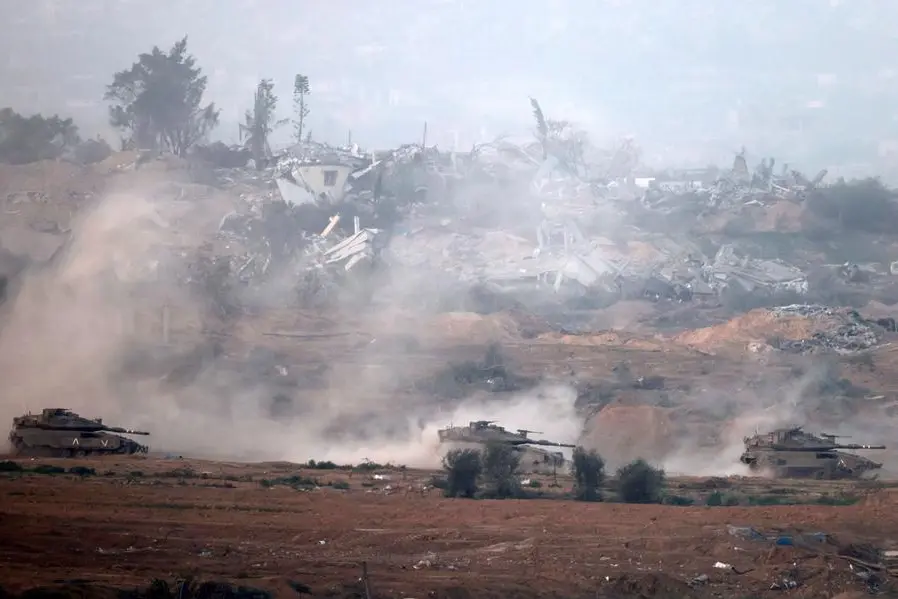PHOTO
US Secretary of State Antony Blinken was due to hold talks Wednesday with the head of the Palestinian Authority, which Washington hopes could govern Gaza after Israel's war with Hamas ends.
The United States' top diplomat was on his fourth crisis visit to the Middle East since the war in the Gaza Strip began, meeting with Israeli Prime Minister Benjamin Netanyahu in Tel Aviv on Tuesday.
Blinken told a news conference afterwards that the United States would continue to support its ally, but also called on Israel to do more to protect those trapped in the besieged Palestinian territory, saying the "daily toll on civilians in Gaza, particularly children, is far too high".
Washington has floated a post-war scenario in which a reformed Palestinian Authority, currently led by president Mahmud Abbas, governs Gaza in addition to the West Bank.
The authority currently exercises limited rule in the West Bank, which has been occupied by Israel since 1967.
"Israel must stop taking steps that undercut Palestinians' ability to govern themselves effectively," Blinken said Tuesday, emphasising the importance of progress towards a two-state solution.
"The Palestinian Authority also has a responsibility to reform itself, to improve its governance -- issues I plan to raise with president Abbas," he added.
Netanyahu, however, has shown no interest in reviving negotiations towards a Palestinian state, and an early post-war plan outlined by Defence Minister Yoav Gallant envisions local "civil committees" governing Gaza after Israel has dismantled Hamas.
Blinken declined to say on Tuesday whether Netanyahu's views had shifted in their discussions.
Hamas seized sole control of the Gaza Strip in 2007, ousting Abbas's Fatah party, with which it had shared power.
Multiple attempts at reconciliation have failed, but Hamas chief Ismail Haniyeh said last week he was "open to the idea" of a single Palestinian administration in Gaza and the West Bank.
Jordan's royal palace, meanwhile, said King Abdullah II would host Abbas and Egyptian President Abdel Fattah al-Sisi on Wednesday for talks on Gaza, including efforts to "push for an immediate ceasefire".
- 'We see no hope' -
The war in Gaza began after Hamas launched its unprecedented October 7 attack, which resulted in about 1,140 deaths in Israel, mostly civilians, according to an AFP tally based on official figures.
Militants also took around 250 hostages that day. Israel says 132 of them remain in Gaza, including at least 25 believed to have been killed.
Israel has responded with relentless bombardment and a ground invasion of Gaza that have killed at least 23,210 people, mostly women and children, the Hamas-run territory's health ministry said Tuesday.
The ministry announced Wednesday morning that another 70 people were killed and more than 130 wounded in overnight attacks.
The Israeli army announced the death of another soldier early Wednesday, bringing the total killed since its ground invasion began to 186.
The war has displaced the vast majority of Gaza's population, and dire shortages of food, water and medicine have left hundreds of thousands at risk of famine and disease, the UN and WHO have said.
AFP footage on Tuesday showed a crowd of Gazans rushing towards aid trucks carrying flour and canned goods into Gaza City, in the territory's devastated north, with some climbing up the sides of the vehicles and tossing down food.
"We've been listening to the news for 98 days, hoping that the war will end, but due to this difficult situation we see no hope," Ibrahim Saadat told AFP from a camp for displaced people in the southern border town of Rafah.
"Due to the lack of water, we shower just once per month. Psychologically we are suffering, and diseases have spread everywhere."
The WHO warned on Tuesday that its ability to provide aid and support to Gazan hospitals was "shrinking".
During his visit, Blinken called for "more food, more water, more medicine" to be delivered to the territory, and said that Israel had agreed to a UN assessment in the north to "determine what needs to be done to allow displaced Palestinians to return safely".
Israel says it has largely achieved military control over northern Gaza and that operations are focussing further south.
In the southern city of Khan Yunis, wounded people, some of them children, were rushed to hospital on Tuesday after a strike hit displaced Palestinians living in tents at Al-Mawasi camp.
"We were chatting under a palm tree, and suddenly we saw stones and shrapnel everywhere," young Lama Abu Gemmayzeh told AFP.
"Some of us started running, and others were on the ground, and we started screaming for ambulances."
- Fears of escalation -
Since the war started, fears have grown of an escalating conflict between Israel and its other regional enemies, a loose alliance of Iran-backed armed groups in Lebanon, Syria, Iraq and Yemen.
Defence Minister Gallant told Blinken on Tuesday that intensifying pressure on Iran was "critical" and could prevent a regional escalation, an Israeli government statement said.
Hours later, Iran-backed Huthi rebels in Yemen "launched a complex" drone and missile attack in the southern Red Sea, the US Central Command (CENTCOM) said.
The Huthis have carried out numerous attacks in the vital shipping lane in solidarity with Hamas, and the United States has set up a multinational naval task force to protect vessels there.
American and British forces shot down 18 drones and three missiles in the latest attack, CENTCOM said, adding no injuries or damage were reported.





















